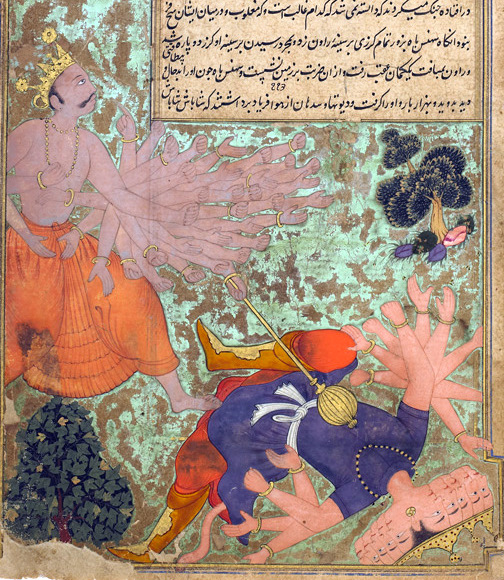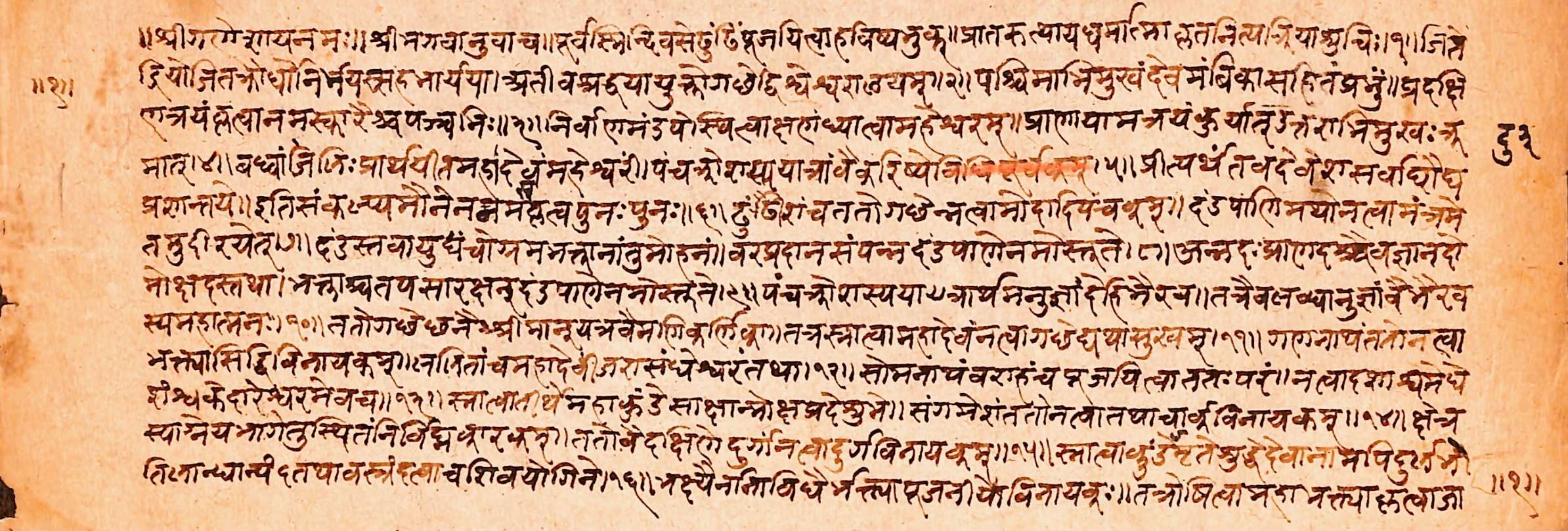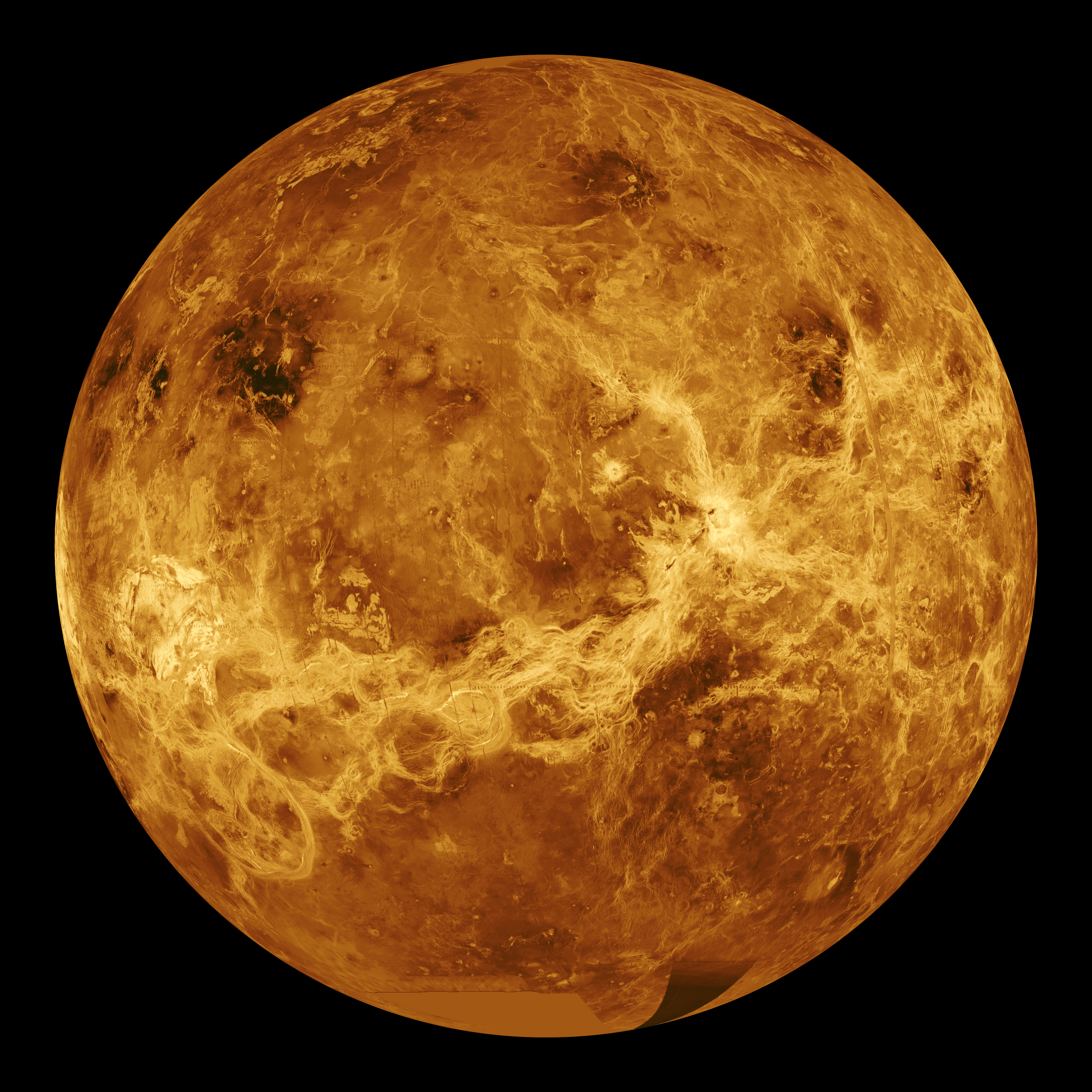|
Yaduvansh
Yadu () is the founder of the Yadu dynasty in Hinduism. He is described to be the eldest son of King Yayati, and his queen, Devayani. Legend According to a narrative found in the Mahabharata, and the Vishnu Purana, Yadu refused to exchange his years of youth with his father, Yayati, when the latter was cursed with senility by his father-in-law, Shukra. Thus, he was cursed by Yayati to have his progeny disinherited of the dominion. Due to this proclamation, Yadu was replaced by his step-brother, Puru, as the heir to the throne of the Chandravamsha dynasty. Yadu founded his own cadet branch of the dynasty, called the Yaduvamsha. Descendants The Agni Purana states that Yadu's lineage was continued by his eldest son, Sahasrajit. Sahasrajit had three sons: Haihaya, Reṇuhaya, and Haya. A historical dynasty called the Haihayas claimed descent from Haihaya. Several castes and communities in modern India, such as Ahir or Yadav, Chudasama, claim descent from Yadu. See also * ... [...More Info...] [...Related Items...] OR: [Wikipedia] [Google] [Baidu] |
Ahir
Ahir or Aheer are a community of traditionally non-elite pastoralists in India, most members of which identify as being of the Indian Yadav community because they consider the two terms to be synonymous. The Ahirs are variously described as a caste, a clan, a community, a race and a tribe. The traditional occupations of Ahirs are cattle-herding and agriculture. Since late 19th century to early 20th century, Ahirs have adopted ''Yadav'' word for their community and have claimed descent from the mythological king Yadu as a part of a movement of social and political resurgence Quote: "The movement, which had a wide interregional spread, attempted to submerge regional names such as Goala, Ahir, Ahar, Gopa, etc., in favour of the generic term Yadava (Rao 1979). Hence a number of pastoralist castes were subsumed under Yadava, in accordance with decisions taken by the regional and national level caste sabhas. The Yadavas became the first among the shudras to gain the right to wear ... [...More Info...] [...Related Items...] OR: [Wikipedia] [Google] [Baidu] |
Yadu Dynasty
Yaduvamsha () or Yādava Vaṃśa is a legendary dynasty featured in Hinduism, a cadet branch of the Chandravamsha dynasty. The dynasty's progenitor was Yadu, the eldest son of Emperor Yayati. Legend Origin In Hindu texts, the king Yayati was cursed by Sage Shukracharya with premature old age due to being unfaithful to his daughter, Devayani. According to a narrative found in the ''Mahabharata'', and the ''Vishnu Purana'', Yadu refused to exchange his years of youth with his father Yayati. So, he was removed from the king's line of succession, inheriting none of his domains. He was excluded from the Somavamsha, better known as Chandravamsha dynasty. Only the dynasty of King Puru, the youngest of the sons of Yayati was entitled to be known as Somavamsha, as Puru had obeyed his father. King Yadu ordered that the future children of Yadu would be known as Yadavas, and the dynasty would be known as ''Yaduvamsha''.Thapar, Romila (1978, reprint 1996). ''Ancient Indian Social His ... [...More Info...] [...Related Items...] OR: [Wikipedia] [Google] [Baidu] |
Lunar Dynasty
The Lunar dynasty (IAST: Candravaṃśa) is a legendary principal house of the Kshatriyas varna, or warrior–ruling caste mentioned in the ancient Indian texts. This legendary dynasty was said to be descended from moon-related deities (''Soma'' or ''Lunar''). The Hindu deity Krishna is believed to have been born in the Yaduvamsha branch of the Lunar dynasty. According to the ''Shatapatha Brahmana'', Pururavas was the son of Budha (himself often described as the son of Soma) and the gender-switching deity Ila (born as the daughter of Manu). Pururavas's great-grandson was Yayati, who had five sons named Yadu, Turvasu, Druhyu, Anu, and Puru. These seem to be the names of five Vedic tribes as described in the Vedas. According to the ''Mahabharata'', the dynasty's progenitor Ila ruled from Prayaga, and had a son Shashabindu who ruled in the country of Bahli. The son of Ila and Budha was Pururavas who became the first Chandravamsha emperor of the entirety of the earth. Ila's ... [...More Info...] [...Related Items...] OR: [Wikipedia] [Google] [Baidu] |
King Puru
Puru () is a legendary king in Hinduism. He is the youngest son of King Yayati and Sharmishtha, and one of ancestors of the Pandavas and the Kauravas. King Puru marries Kausalya, and is succeeded by his son, Janamajeya. Legend Bhagavata Purana Puru enthroned by Yayati, made by Bhawani from Razmnama In the nineteenth chapter of book nine of the Bhagavata Purana, Puru is described as having four brothers; Yadu, Turvasu, Druhyu, and Anu. He exchanges his youth for the old age of his father Yayati when the latter gets cursed by Shukracharya, allowing his father to enjoy his youth for a thousand years. Afterwards, Yayati takes back his curse and makes Puru his heir, though he is the youngest of them all. His successor is Práchinvat; his son is Pravíra; his son is Manasyu. Mahabharata In the Mahabharata's Adi Parva, he is said to have inherited his kingdom in the Gangetic plain. He is said to have three mighty heroes as sons by his wife Paushti; Pravira, Īśvara, and Raudr� ... [...More Info...] [...Related Items...] OR: [Wikipedia] [Google] [Baidu] |
Ikshvaku
Ikshvaku (Sanskrit ; Pāli: ) is a legendary king in Hindu mythology. He is described to be the first king of the Kosala kingdom, and was one of the ten sons of Shraddhadeva Manu, the first man on the earth. He was the founder and first king of the Ikshvaku dynasty, also known as the Suryavamsha, in the kingdom of Kosala, which also historically existed in ancient India. He had a hundred sons, among whom the eldest was Vikukshi. Another son of Ikshvaku's, named Nimi, founded the Kingdom of the Videhas. Rama and the Buddha are also stated to have belonged to the Suryavamsha or Ikshvaku dynasty. He is mentioned in the Vishnu Purana. In Jain texts, it is mentioned that Rishabhadeva is the same as King Ikshvaku (son of Nabhiraja). Except for Munisuvrata and Neminatha, the remaining Jain Tirthankaras are believed to have been royals of the Ikshvaku lineage. Origin From Kashyapa, through Aditi, Vivasvan was generated, and from him came Shraddhadeva Manu, who was born from the womb of ... [...More Info...] [...Related Items...] OR: [Wikipedia] [Google] [Baidu] |
Raghu
Raghu () is a ruler of the Suryavamsha dynasty in Hinduism. According to the '' Raghuvamsha'', he is the son of King Dilīpa and Queen Sudakshina. His successors styled themselves as belonging to the eponymous Raghuvamsha dynasty, or the ''Raghukula,'' after him. The history of his dynasty is elaborated upon by the poet Kalidasa in his ''Raghuvamsha''. He is the great-grandfather of the avatar of Vishnu, Rama. Legend Raghuvamsha The life and glories of Raghu are described in the poem Raghuvamsha, written by Kalidasa. In the third canto, his birth, education, and marriage are described. He participates in the hundredth ashvamedha sacrifice of his father, fighting Indra, who steals the sacrificial horse. His victory against the deity is followed by his ascension to the throne, after Dilipa retires to the forest. In the fourth canto, Raghu expands his domains, subjugating the kings of Vanga, Utkala, Kalinga, the Pandya king, Huns, Persians, and Pragjyotisha. On the inst ... [...More Info...] [...Related Items...] OR: [Wikipedia] [Google] [Baidu] |
Yadav
Yadav refers to a grouping of traditionally non-elite, Quote: "The Yadavs were traditionally a low-to-middle-ranking cluster of pastoral-peasant castes that have become a significant political force in Uttar Pradesh (and other northern states like Bihar) in the last thirty years." peasant- pastoral communities or castes in India that since the 19th and 20th centuries Quote: "In a not dissimilar way the various cow-keeping castes of northern India were combining in 1931 to use the common term of Yadava for their various castes, Ahir, Goala, Gopa, etc., and to claim a Rajput origin of extremely doubtful authenticity." have claimed descent from the mythological king Yadu as a part of a movement of social and political resurgence. Quote: "The movement, which had a wide interregional spread, attempted to submerge regional names such as Goala, Ahir, Ahar, Gopa, etc., in favour of the generic term Yadava (Rao 1979). Hence a number of pastoralist castes were subsumed under Yadava, in ... [...More Info...] [...Related Items...] OR: [Wikipedia] [Google] [Baidu] |
Heheya Kingdom
The Heheya Kingdom (also known as Haihaya, Haiheya, Heiheya _sa.html" ;"title="nowiki/> sa">हैहय was a kingdom ruled by the Yadava people, who claimed to be descended from Yadu, a legendary king of Chandravamsha lineage. One of the most well known Haihaya rulers was Kartavirya Arjuna. It is believed that the Kingdom was involved with a number of conflicts with neighboring kingdoms, and it is believed that it was ultimately defeated by the Bhargava leader Parashurama. The capital of the Heheya Kingdom was Mahishmati, located on the banks of the Narmada River in present-day Madhya Pradesh. Haihaya clans The Haihayas were an ancient confederacy of five ''gana''s (clans), who claimed their common ancestry from Yadu. According to the ''Harivamsha Purana'' (34.1898), Haihaya was the great-grandson of Yadu and grandson of Sahasrajit.Pargiter, F.E. (1972) 922 ''Ancient Indian Historical Tradition'', Delhi: Motilal Banarsidass, p.87. In the ''Vishnu Purana'' (IV.11), al ... [...More Info...] [...Related Items...] OR: [Wikipedia] [Google] [Baidu] |
Agni Purana
The ''Agni Purana'', ( sa, अग्नि पुराण, ) is a Sanskrit text and one of the eighteen major Puranas of Hinduism. The text is variously classified as a Purana related to Shaivism, Vaishnavism, Shaktism and Smartism, but also considered as a text that covers them all impartially without leaning towards a particular theology. The text exists in numerous versions, some very different from others. The published manuscripts are divided into 382 or 383 chapters, containing between 12,000 and 15,000 verses. The chapters of the text were likely composed in different centuries, with earliest version probably after the 7th-century,Thomas Green (2001). ''Martial Arts of the World: An Encyclopedia'', ABC-CLIO, , page 282 but before the 11th century because the early 11th-century Persian scholar Al-Biruni acknowledged its existence in his memoir on India. The youngest layer of the text in the ''Agni Purana'' may be from the 17th century. The ''Agni Purana'' is a medieval er ... [...More Info...] [...Related Items...] OR: [Wikipedia] [Google] [Baidu] |
Shukra
Shukra (Sanskrit: शुक्र, IAST: ) is a Sanskrit word that means "clear" or "bright". It also has other meanings, such as the name of an ancient lineage of sages who counselled Asuras in Vedic history. In medieval mythology and Hindu astrology, the term refers to the planet Venus, one of the Navagrahas. Hinduism In Hinduism, Shukra is one of the sons of Bhrigu, of the third Manu, one of the ''saptarishis''. He was the guru of Daityas and Asuras, and is also referred to as Shukracharya or Asuracharya in various Hindu texts. In another account found in the ''Mahabharata'', Shukra divided himself into two, one half becoming the fount of knowledge for the devas (gods) and the other half being the knowledge source of the asuras (demons). Shukra, in the Puranas, is blessed by Shiva with Sanjeevini Vidhya after worshipping and impressing Shiva with his devotion. Sanjeevini Vidhya is the knowledge that raises the dead back to life, which he used from time to time to restore ... [...More Info...] [...Related Items...] OR: [Wikipedia] [Google] [Baidu] |
Yayati
Yayāti ( sa, ययाति, translit=Yayāti), is a king in Hindu tradition. He is described to be a Chandravamsha king. He is regarded to be the progenitor of the races of the Yadavas and the Pandavas. He is considered in some texts to the son of King Nahusha, and his wife, Ashokasundari, daughter of Shiva and Parvati; however, early sources state that Virajas, daughter of Pitris, was the mother of Yayati. He had five brothers: Yati, Samyati, Ayati, Viyati, and Kriti. Yayāti had conquered the whole world and was the '' Chakravarti'' ("Universal Monarch" or "World Emperor"). He married Devayani, the daughter of Shukra, and also took Sharmishtha, daughter of king Vrishaparvan, and the maid of Devayani, as his mistress. Upon hearing of his relationship with Sharmishtha, Devayani complained to her father, who in turn cursed Yayāti to old age in the prime of life, but later allowed him to exchange it with his son, Puru. His story finds mention in the ''Mahabharata's'' Ad ... [...More Info...] [...Related Items...] OR: [Wikipedia] [Google] [Baidu] |

.png)




